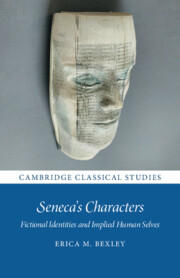Acknowledgements
Writing this book has been a lesson in the value of getting things done earlier and faster, a lesson I have learned the hard way. Unlike many first monographs, mine did not begin life as a doctoral dissertation, but emerged gradually, as a shadowy prospect, during the time I spent at the Australian National University immediately post-PhD. There ensued a change of hemispheres and several institutions before I arrived and settled in Durham’s Department of Classics and Ancient History. Before I could complete the typescript to my satisfaction, however, there also ensued a child (a most welcome joy) and a pandemic (not so welcome). Throughout all of this, my book project remained a constant, sometimes nagging, companion: when would it be finished? When could I remove it from my list of responsibilities and hand it over to the academic community at large? That I have, now, achieved this goal is an immeasurable relief.
Understandably, an enterprise as long-lived and much-travailed as this one accrues a lot of debts. The ideas contained within these pages have been aired, in various forms, to audiences at: Melbourne and Sydney Universities, the Australian National University, Cornell, Oxford, Edinburgh, Swansea, UWTSD Lampeter, the Cambridge Philological Society, the Cambridge A Caucus seminars, the University of Belgrade, St Andrews, and Durham. In every case I am grateful for having had the opportunity to present my research to such appreciative and helpful colleagues; I have benefitted from each and every one of these events. Special thanks are also due to three departments in particular: to the Cambridge Classics Faculty, for believing in me to the extent of giving me a job when I badly needed one (and for letting me sneak my monograph into their ‘Classical Studies’ series); to Swansea’s Department of Classics, Ancient History and Egyptology for giving me my first ongoing position and for its warm, friendly atmosphere in which my research flourished; and finally, to Durham’s Department of Classics and Ancient History, for granting me, alongside stable employment, the stability of a home.
I have profited from conversations with colleagues and students at all levels, both formally and informally. Teaching the Thyestes at Cambridge and again at Swansea sharpened my insight into this tightest and darkest of Senecan dramas. Similarly, though perhaps less expected, my Advanced Latin classes at Durham, on Plautus and Terence, got me thinking about the quasi-comic aspects of Seneca’s tragedies. Equally helpful were the conversations I enjoyed, and remarks, criticism, and encouragement I received from the following colleagues: George Boys-Stones, Barbara Graziosi, Kathryn Stevens, Ioannis Ziogas, Richard Hunter, Stephen Oakley, Emily Gowers, Fritz-Gregor Herrmann, Helen Slaney, Matthew Leigh, and Peter Davis. And, although it is not my doctoral dissertation, this book still bears the imprint of my formative years at Cornell; many and sincere thanks are due to the Cornell Classics department for accepting me, long ago, into its remarkable graduate programme, and to my supervisory committee – Mike Fontaine, Jeff Rusten, Charles Brittain, Fred Ahl – for pushing me to question the scholarly status quo and to think about Seneca in new ways. Fred Ahl and Mike Fontaine in particular have provided unstinting support in the form of academic insight, publishing opportunities, and career advice. Ample thanks must also be given to the two anonymous Cambridge University Press readers, whose suggestions greatly improved the book’s argument and my sense of the project overall. I am grateful, too, to my CUP production team: my content manager, Nicola Maclean; production manager, Jayavel Radhakrishnan; and copy editor, Maria Whelan. Their help and care with the typescript has been immeasurable. Lastly, I must thank both Cambridge University Press and DeGruyter for permission to republish some material: parts of Chapter 1 have been adapted from my CCJ article, ‘Recognition and the Character of Seneca’s Medea’Footnote 1, while the last section of Chapter 3 has been adapted from my ‘Doubtful Certainties: The Politics of Reading in Seneca’s Oedipus’Footnote 2. Reprinted with permission.
At the end of this long catalogue come my deepest, most personal expressions of gratitude. To Emily Gowers for supporting my research and my career before I was even aware of it, for calming my anxieties and providing kind advice, for being so reliable and so generous with her time. To my parents, who taught me the value of hard work and persistence, and who continued to believe in me even – especially! – when I was floundering. Finally, to my beautiful family: my husband, Ioannis, who encouraged this project from its slender beginnings all the way through to my final flurry of work under quarantine conditions, who listened patiently to my ideas, pushed me to argue them with more force, and put up with me on the many occasions when the project stalled or hit dead ends. He has been living with this book for as long as I have; I’m sure his relief at its publication equals if not exceeds my own. And to my little daughter, Daphne, who arrived during my drafting of the final chapter, and to Marcus, my even littler son, who burst onto the scene in time for copy editing and indices. Both have helped, in their own ways, with smiles that are utter sunshine.
1 Bexley, E. M. (2016) ‘Recognition and the Character of Seneca’s Medea’ CCJ 62: 31–51.
2 Bexley, E. M. (2016) ‘Doubtful Certainties: The Politics of Reading in Seneca’s Oedipus’ in P. Mitsis and I. Ziogas (eds.) Wordplay and Powerplay in Latin Poetry. Berlin: 355–76.

